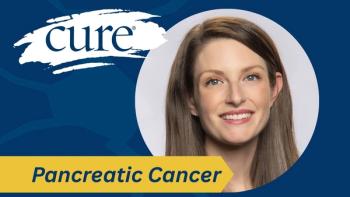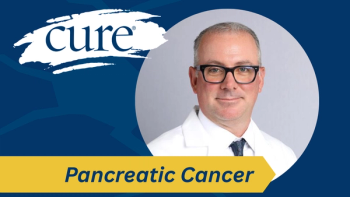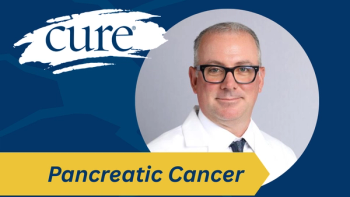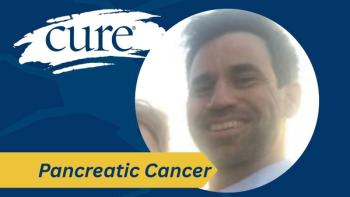
- Spring 2008
- Volume 2
- Issue 1
Surviving With A Plumb
After a diagnosis of pancreatic cancer, this Missouri man is undaunted in efforts to connect with others.
In December 2000, as soon as he could after surgery for stage 4 pancreatic cancer, John Plumb Sr. wheeled himself around the corridors of Barnes-Jewish Hospital in St. Louis, combing bulletin boards in search of support groups.
He wants to create enough awareness about pancreatic cancer to increase positive results. Advances in treatment of cancers such as breast and colon in the last 10 years happened because of the persistence of those impacted, Plumb says. “I’m not a medical expert, but I do know it’s better to talk about it.’’ Questions lead to research, funding, better treatments, and cures, he explains.
According to National Cancer Institute figures, about 37,170 people were diagnosed with pancreatic cancer in 2007, and an estimated 33,370 died of it.
It’s the “third or fourth cause of cancer death,’’ says Steven Strasberg, MD, Pruett Professor of Surgery and head of hepatobiliary-pancreatic and gastrointestinal surgery at Washington University in St. Louis. He also was Plumb’s oncologist.
There is reason for hope, Strasberg says. It wasn’t until 2005 that there were fewer new cases than deaths. The survival rate has continued to climb the last 25 years because operations for pancreatic cancer have become safer, he says. The lucky few who get to the surgeon in time stand a very good chance of recovery. “We are very encouraged,’’ Strasberg says.
The numbers fuel Plumb’s efforts; however, it’s a constant challenge.
There is no screening for pancreatic cancer and it is hard to detect early. By the time symptoms occur, in most cases, cancer cells have spread to the lymph nodes and other organs, making it hard to treat. Pancreatic cancer is also very resistant to chemotherapy and to newer, biologically targeted treatments.
“How lucky I am to have so many prestigious physicians and scholars in the cancer community willing to help.”
Before Plumb’s chronic stomachaches in the fall of 2000, he had had no serious health issues. He drove a heavy-duty tractor for a living and to relax, he played baseball, softball, and volleyball. Before the cancer diagnosis, Plumb says, he had never been hospitalized or on medicine for a chronic illness.
“Basically, I got a little ailment, ate a bowl of chicken soup, and was feeling better.’’
The constant pain in his upper abdomen came “out of nowhere.” The day he doubled over with pain so severe he could not move, he knew something was seriously wrong. In early December, on his 60th birthday and 42nd wedding anniversary, he and Gay received the news, which Gay calls devastating.
“Immediately you start thinking about how you could have been more proactive,” she says. Recalling some of his lab results from a physical exam before the cancer, Gay questions whether it was cancer then.
Plumb had surgery almost immediately. The cancer was in the head of the pancreas and involved two lymph nodes, which were excised. The procedure was a success. “Dr. Strasberg is a miracle worker,’’ Gay says.
In less than a month, he went from surgery to recovery to radiation to chemotherapy. But there was no one around who had been through it, which Plumb says was the “worst feeling in the world.” Fortunately, his son, John Plumb Jr., who lives in Austin, Texas, connected him with a colleague whose dad had survived pancreatic cancer.
Plumb didn’t want anybody going through cancer to experience that isolation. With encouragement from his pastor at Lake St. Louis Baptist Church, he created the Tri-County Cancer Support Group. The organization met monthly at the church.
“We had seven at the first meeting, and I thought, ‘This is a good start.’ ” Others eventually came from all over. “They kept coming,’’ Plumb remembers.
“I love John’s exuberance. It was impressive that he had gone through hell and back and was committed to helping people.”
The idea appealed to cancer doctors and nurses who volunteered as speakers. Plumb took out ads in the local newspaper and got the stamp of approval from the American Cancer Society when it took over the group’s mailings.
There were annual Thanksgiving gatherings. “All the food and support and love they could want at no cost to them, mind you,” Plumb points out. “I can’t recall a time I was turned down. Wal-Mart, the local grocers, church volunteers. Nurses from the cancer treatment center would bring food. The Cancer Care doctors contributed money and entertainment.”
For five years the group flourished as Plumb endured more challenges. Less than two years after his surgery, Gay was diagnosed with stage 1 uterine cancer and underwent a complete hysterectomy. “Thankfully, it was caught early in my annual Pap smear,” Gay says.
After Gay’s surgery, a lump Plumb discovered under his right arm led to early diagnosis and treatment of non-Hodgkin’s lymphoma. In between, Plumb was severely injured in a traffic accident while trying to rescue his two grandsons, whose sleigh was stuck in icy conditions. If it were not for his Navy medic training and his proficient tourniquet, he may have lost a foot. He spent 21 days in the hospital and limps as a result of a metal rod from his knee to his ankle.
As the support group grew, Plumb wanted to reach more people. Steve Kaspar, KFAV co-owner, liked the idea of a cancer talk show. “I love John’s exuberance. It was impressive that he had gone through hell and back and was committed to helping people.”
The live, non-profit, weekly program runs September through November in the evenings. Plumb, guests, experts, and patients talk about issues: diagnoses, symptoms, treatments, facilities, second opinions, medications, recovery, recurrence. The show is a good mix of John’s everyman style and the medical experts’ approach, Kaspar says.
Kaspar estimates there are about 15,000 listeners. While there are no on-air call-ins, he suggests from the feedback that the community embraces the idea. E-mails have been positive, and Kaspar says he constantly runs into locals who say, “I love Surviving Cancer.”
“There are few, if any, radio stations that stop the music to do a half-hour show about cancer,” Kaspar says. “A radio station that plays music should also bear the responsibility of connecting with the public on important issues. When cancer strikes almost every family in some way or another, let’s talk.”
The sponsorships came pouring in, he adds. Valvoline Oil, the local florists, the local pharmacy, a carpet retailer—all wrote checks.
Plumb likes to talk about the youngest pancreatic cancer patient he helped. She was diagnosed at age 12 and was not doing well post-surgery. He featured her on the show twice. “Her immune system was wiped out. She was catching every­thing. She was in an adult treatment center. I urged her parents to get her into Barnes’ Children’s [hospital]. Four years later, she’s a high-school cheerleader, being a normal teenager.”
Plumb says the hardest cases come when someone has waited too long to get symptoms checked out. “It’s hard to encourage somebody when they’ve waited to get checked out or the cancer wasn’t found in time. I tell them they can’t lose sight. You go on and make the best of the situation and get the help you can get.”
The survivor group now is run by Barnes-Jewish Hospital. When Plumb is not on the radio, visiting treatment centers, modeling wigs to make patients laugh, or participating in a celebrity golf tournament to raise awareness, he’s answering phone calls and e-mails and driving a school bus. Gay says his humor and optimism keep the family going. Their other son, Daniel, and his family live nearby, and the grandchildren keep them both happy, she says.
Seven years surviving a deadly cancer is reason to be upbeat, Plumb says. The mind goes south when you hear the word cancer, but it’s not necessarily a death sentence anymore, he says.
“Organizations like PanCAN (a national patient advocacy group for pancreatic cancer) and excellent doctors like Dr. Strasberg work hard every day to change the outcome. A great number of people have a great chance of living a long time with all the new treatment. I’m still here.”
The mission was futile, prompting a puzzled Plumb to question the first staff person he encountered: “Where is help for people like me?’’
“There aren’t any support groups for pancreatic cancer because patients don’t usually live,” he was told. A stunned Plumb, at age 60, decided to create his own.
“Nobody should go through something like this alone,’’ Plumb says now, in an interview with his wife, Gay, from their Lake St. Louis, Missouri, home.
It’s November and Plumb is at his busiest as a survivor champion because November is National Pancreatic Cancer Awareness Month. Plumb’s radio show, Surviving Cancer, is well into its fifth year on local radio station KFAV-FM. Washington University professor and cancer researcher Timothy Pluard, MD, is co-host this season.
“How lucky I am to have so many prestigious physicians and scholars in the cancer community willing to help,’’ says Plumb, who turned 68 in December.
His support group, too, has generated interest. Only months into recovery in spring 2001, he founded the Tri-County Cancer Support Group. Plumb is particularly thrilled when he can help those who are going through pancreatic cancer.
Articles in this issue
about 18 years ago
Gastronomical Distressabout 18 years ago
Defining Perceptionsabout 18 years ago
Voicesabout 18 years ago
Reel-Life Cancerabout 18 years ago
Prevention in Americaabout 18 years ago
A Shot at Preventionabout 18 years ago
Heart & Lung Watchabout 18 years ago
Shouldering Debtabout 18 years ago
Relay for (Second) Lifeabout 18 years ago
Figurative Testimonials



